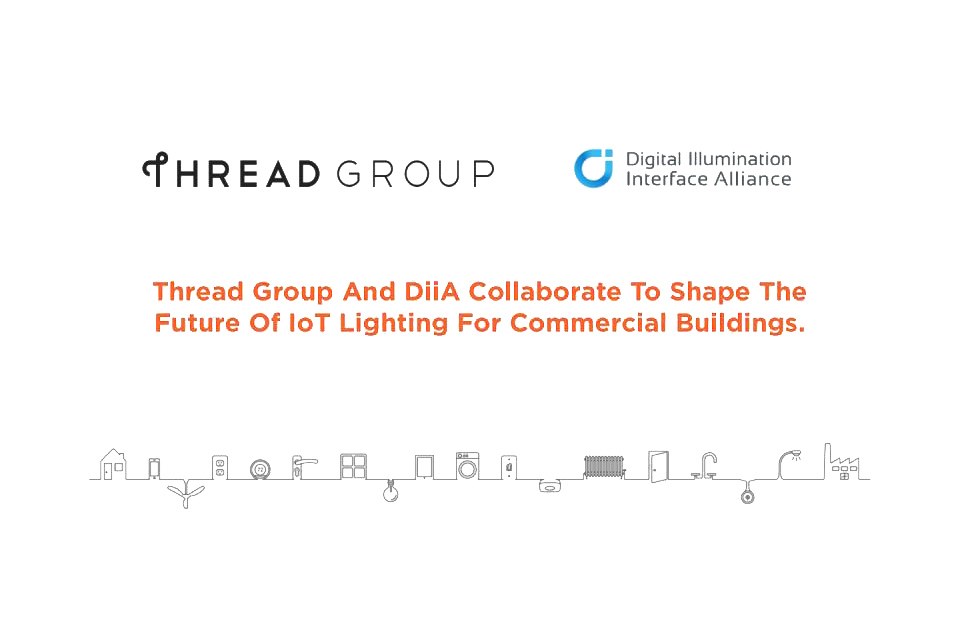Thread Group and DiiA Collaborate to Shape the Future of IoT Lighting for Commercial Buildings
The Thread Group, an alliance addressing convergence, security, power, and architecture challenges at the network layer, and the DiiA, the global DALI alliance of companies from the lighting and sensor industries, have announced a liaison agreement today with the shared intention of accelerating IoT adoption in commercial buildings.
The organizations will collaborate to implement the DALI lighting-control application on top of Thread's low-power, secure and self-healing wireless mesh network. The goal is to offer a certification program to ensure interoperability and enable IoT developers to more quickly bring their lighting and sensor products to market.
"When fully realized, IoT technology will bring unprecedented efficiency, cost-savings and functionality to commercial buildings," said Sujata Neidig, vice president of marketing, Thread Group. "This liaison agreement furthers Thread's commitment to the convergence of IoT with IP as the foundation and the expansion of smart solutions both in the home and where we work."
"Running the DALI application layer on top of Thread's wireless network solution will become a core offering for DiiA and will accelerate the integration of these technologies into the commercial space," said Paul Drosihn, DiiA General Manager. "We're excited that Thread is the first IP-based carrier for which DiiA plans to offer certification."
Thread is a low-power wireless mesh networking protocol, based on the universally supported Internet Protocol (IP) and built using open and proven standards, that is accelerating IoT adoption.
DiiA identified that Thread can serve as a wireless network transport for its well-established DALI application-layer protocol. Likewise, Thread identified DALI as a suitable application layer for Thread in lighting and general commercial building applications including sensor networks. Together, DiiA and Thread will implement protocols for commissioning and operating devices in lighting and building networks. These will include credential delivery, service discovery and network management.
DiiA intends to make an IP-based version of its DALI application layer available. The fundamental specifications are published as Part 104 of the IEC 62386 standard, which specifies the use of Internet Protocol (IP) and User Datagram Protocol (UDP) for IEC 62386 application-layer transport. To enable interoperability and certification for developers, DiiA plans to add further crucial details to this published standard.
About Thread Group:
Formed in 2013, the non-profit Thread Group is focused on making Thread the foundation for the internet of things in homes and commercial buildings. Built on open standards, Thread is a low power wireless networking protocol that enables direct, end-to-end, secure and scalable connectivity between IoT devices, mobile devices, and the internet. And, because Thread is IP-based, it seamlessly integrates with many environments, apps, devices and clouds. The Thread Group provides a rigorous certification program to ensure device interoperability and a positive user experience. Thread is backed by industry-leading companies including Apple, Arm, Google/Nest, Lutron, Nordic Semiconductors, NXP Semiconductors, OSRAM, Qualcomm, Siemens, Silicon Labs, Somfy and Yale Security.- www.threadgroup.org/
About DiiA:
The Digital Illumination Interface Alliance (DiiA) is an open, global consortium of lighting companies that aims to grow the market for lighting-control solutions based on Digital Addressable Lighting Interface (DALI) technology. DiiA is driving the adoption of DALI-2, the latest version of the internationally standardized DALI protocol. DALI-2 includes more product types, more features, clearer specifications, increased testing, and product certification.
The DALI-2 certification and trademark program, operated by DiiA, builds confidence in cross-vendor product interoperability. DiiA develops test specifications for DALI-2 product compliance testing, and also creates new specifications for additional DALI-2 features and functions. The D4i certification program from DiiA brings standardization to intra-luminaire DALI. - www.digitalilluminationinterface.org

